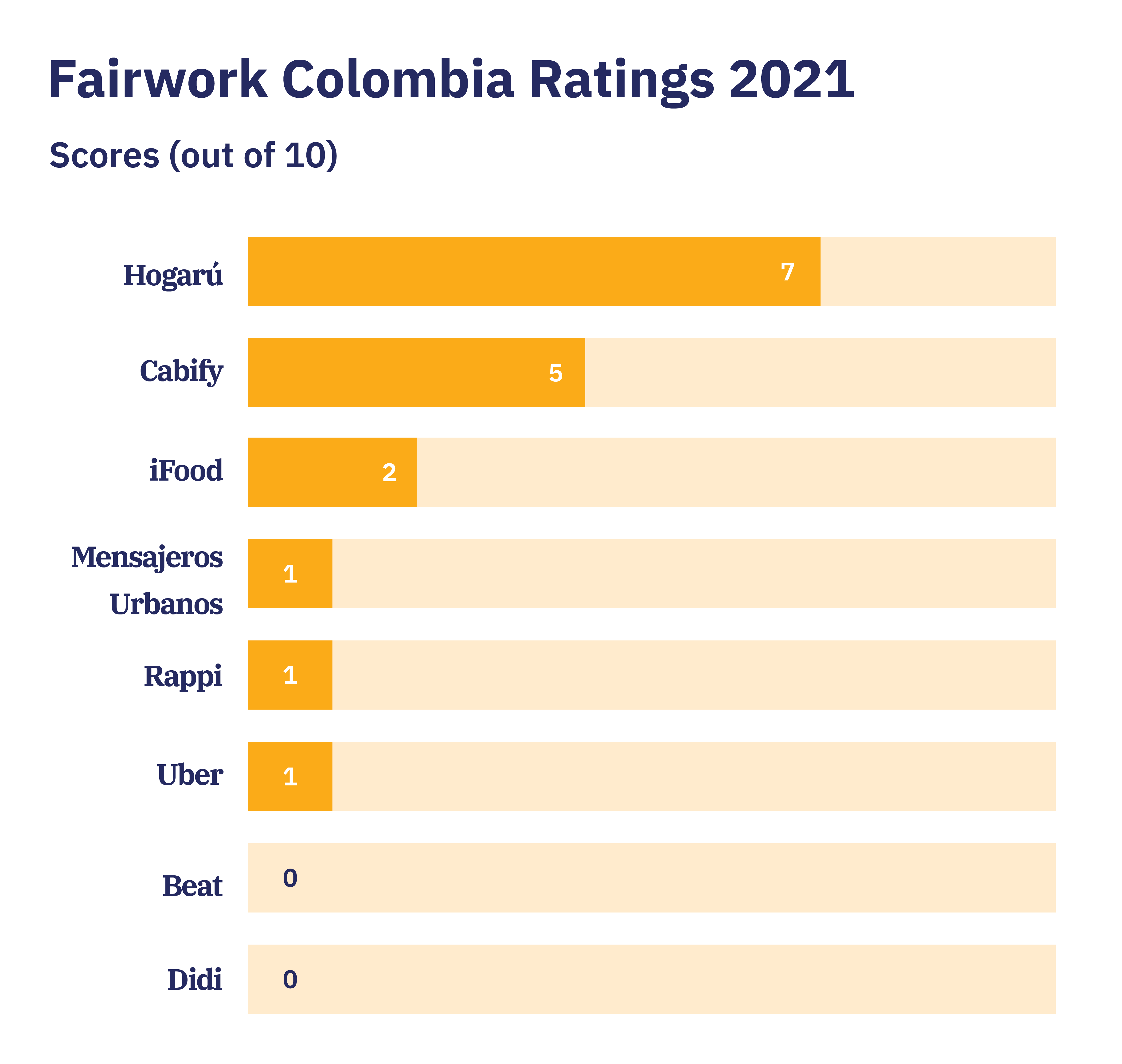New report! Delivery and ride-hailing platforms in Colombia fail to offer fair working conditions

The ‘Fairwork Colombia Ratings 2021: The Promise of Social Security Reforms in the Gig Economy’ report evaluates the working conditions at eight of the most important domestic care, delivery, and ride-hailing platforms in the country (Rappi, Ifood, Mensajeros Urbanos, Uber, Didi, Cabify, Beat, Hogarú) against five principles of fair work. The scores achieved by these platforms range from 0 to 7. With 7 points, Hogarú is first and Cabify second with 5; iFood comes in third place having attained 2, followed by Mensajeros Urbanons, Rappi and Uber each with 1 and, at the bottom, Beat and Didi scored 0 points. The results demonstrate substantial room for improvement, particularly among ride-hailing and delivery apps.
The platform economy is considered by many to be an important contributor to the Colombian economy and is estimated to constitute as much as 0.2% of GDP. Experts and policymakers have celebrated the economic benefits of platform innovation, such as the increased productivity as well as its implications for other digital infrastructures in the banking and financial services sectors.
Colombia, however, suffers some of the highest levels of income inequality of any Latin American country. 48% of the population in large cities are estimated to be employed in informal sectors of the economy while unemployment hovers around the 10% mark. Moreover, Colombia has received almost 1.7 million Venezuelan migrants over the last five years contributing to the challenging landscape of the labour market. In this context, studies suggest around 200,000 people work in the food-delivery and ride-hailing sectors.
While many attempts have been made to regulate platform work and several bills have been introduced in Congress, none have successfully passed into law. For example, attempts have been made to define platforms as mobile app intermediaries and a “digital worker” as a person who habitually, personally, directly and on their own account carries out an activity for profit via a platform.
Although the scores achieved by digital platforms in this research have been low, they are comparable with other Latin American countries and have surpassed the scores recently documented in Argentina. Nonetheless, a monumental effort must be undertaken before the platform economy in Colombia can be considered fair.
Fairwork scores digital labour platforms based on five global principles of ‘fair work’ – Fair Pay, Fair Conditions, Fair Contracts, Fair Management, and Fair Representation. Evidence on whether platforms comply with these five principles was collected through desk research, interviews with workers, and platform-provided evidence. The evidence was then used to assign a Fairwork score out of ten to each platform.

Key Findings:
Fair Pay: Three platforms show evidence that workers’ gross pay is at least or above the minimum wage, which in 2021 was 3,785 COP/hour. But only one platform, Cabify, could demonstrate that workers earn a living wage (10,706 COP/hour for 2021). The calculations also take into account equipment costs and other work-related costs.
Fair Conditions: Two platforms were able to provide evidence that they actively take action to protect workers from risks that arise in their jobs. These platforms were able to evidence some form of COVID-19 response, including providing personal protective equipment (PPE) to the workers free of charge and schemes of healthcare coverage and accident insurance. But only one platform, Hogarú, was found to provide social security, sick pay, and paid maternity leave.
Fair Contracts: While seven platforms had clear and accessible terms and conditions, most of them were unable to demonstrate that they notify workers in advance of important changes. Three platforms could provide evidence that disputes were resolved within Colombian jurisdiction but only a single platform was able to provide evidence that the employment status of their workers is clearly defined and that it does not unreasonably exclude liability.
Fair Management: Because of the increasing role of automation, only two platforms, Hogarú y Cabifi, could provide evidence of fair communication and the existence of an appeal process. Indeed, many workers have complained about the disappearance of in-person contact. Different platforms have established campaigns to support equality, diversity, and inclusion, particularly in the relationship between customers and workers, but few could demonstrate any concrete policies.
Fair Representation: This is a critical matter in Colombia. Workers’ organisations and unions have been historically stigmatised and suffered political persecution and even violence. They are also regarded with distrust by companies. In the case of the digital platforms, there is resistance to recognising any kind of representation because it is assumed to be a part of employer–worker relations. Despite this gloomy context, one platform, Hogarú, scores the point for 5.1 . This is mainly due to the platform’s efforts to recognise workers’ collective representation as well as the right for them to choose their own representatives.
The Fairwork Pledge
As part of Fairwork’s commitment to making platforms accountable for their labour practices, we have launched the Fairwork Pledge. This pledge aims to encourage other organisations to support decent labour practices in the platform economy, guided by the five principles of fair work.
Organisations like universities, schools, businesses, investors and charities that make use of platform labour can make a difference by supporting platforms that offer better working conditions.
Organisations have the option to sign up to the Pledge as an official Fairwork Supporter or an official Fairwork Partner. Those signing up to be a Supporter must demonstrate their support for fairer platform work publicly and provide their staff with appropriate resources to make informed decisions about what platforms to use. Becoming a Fairwork Partner entails making a public commitment to implement changes in their own internal practices, such as committing to using better-rated platforms when there is a choice.